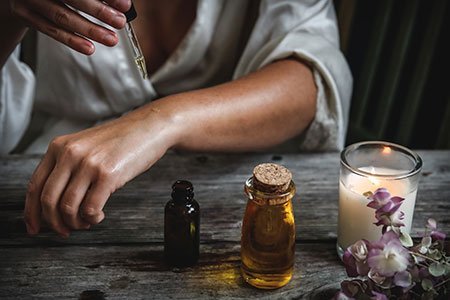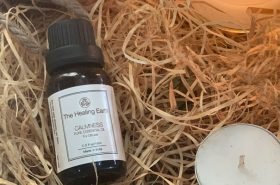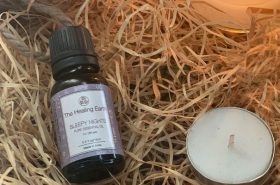ESSENTIAL OILS
Essential oil is a concentrated liquid containing volatile aroma compounds from plants. Essential oils are known as the oil of the plant from which they were extracted. They contain the “essence of” the plant’s fragrance—the characteristic fragrance of the plant from which it is derived. They are used in perfumes, cosmetics, soaps and other products, for flavouring food and drink, and for adding scents to incense and household cleaning products.
Essential oils have been used in medicine throughout history. Interest in essential oils has revived in recent decades with the popularity of aromatherapy, a branch of alternative medicine that uses essential oils and other aromatic compounds. Medicinally oils are used for treatments of the common cold to cancer. Their benefits not only include healing physical ailments but decreasing stress and anxiety as well.

People often mistake aromatherapy oils for essential oils. Primarily both are derived from the same plant. However, An ‘aromatherapy oil’ is usually a 2% dilution of essential oil in 98% carrier oil. A carrier oil is generally a plant-based oil like almond or jojoba or any other oil. On the other hand, ‘essential oils’ are undiluted products that have been extracted from flowers, herbs, leaves and other parts of the plant. They are used in small quantity as they could be highly concentrated. Superior quality essential oils are expensive as producing them is very labour intensive.
Essential oils should be stored in a cool dark place in dark coloured glass bottles.
This is done so as to minimise contact of heat, sunlight and water with the oil. Some essential oils like Tea Tree, Rosemary, Eucalyptus etc are highly flammable and care should be taken while handling them.
BENEFITS OF ESSENTIAL OILS
Essential oils provide a host of benefits when used. Apart from uplifting up the environment with their pleasant fragrance, they can be instrumental in giving complete physical wellness.
- Their fragrance has a calming effect on the brain. Reduce anxiety and stress. Eg lavender, cedarwood.
- Oils like peppermint used to boost energy and aid digestion. It has anti-nausea benefits and clears the respiratory tract.
- Geranium oil Relieves stress and depression, balances hormones, benefits the health of the skin, reduces blood pressure
- Sandalwood oil nerves the brain and helps focus.
- Oil of eucalyptus very effective in the treatment of a common cold.
- Orange essential oil is anti-inflammatory, antidepressant, antiseptic, aphrodisiac.
- Cinnamon oil improves blood circulation and brain function, treats headaches and soothes a sore throat, regulates menstruation, strong detoxifying agent.
- Clove oil is extremely helpful in toothaches.
- Lemongrass oil supports healthy digestion when taken internally, eliminates mental fatigue and brings positivity, natural insect repellant. A very powerful mood uplifter.
- Lavender oil has a calming and relaxing effect, used in perfumes, minor cuts and bruises, moisturises Dry skin and lips.
- Lemon oil treats skin conditions like dull skin, very effective hair tonic, relieves stress, helps in weight management.
HOW TO USE ESSENTIAL OILS
There are several application methods that are effective for applying essential oils. These methods depend on individual needs and preferences.

- A few drops of essential oil can be added to a fragrance-free moisturiser. This can be applied directly on the face.
- A few drops of essential oil can be added to a carrier oil such as castor, jojoba or almond oil. This can be applied to the body. It is recommended that the carrier oil should not have a strong smell so that it does not interfere or modify the smell of the essential oil.
- A few drops of essential oil can be added to the bath tub or a bucket of water. This can be used to take a bath. However, this requires us to use a little extra quantity of oil so that the benefits can be felt.
- An essential oil roll-on applicator can be used directly on the skin. The roll-on applicator has a carrier oil and essential oil mixture, which makes it safe to use directly on the skin.
- To use direct inhalation, you can hold the bottle of an essential oil a few inches from your face. Breathe the scent in and out through the nose.
- You can also place a few drops of essential oil into your palms and inhale. Some oils should be diluted before inhaling.
- Place a few drops of essential oil such as eucalyptus, into a pot of boiling water. With a towel draped over your head, lean carefully over the pot and inhale the steam.
- The essential oil can be used in an essential oil diffuser. This will dispel the aroma in the area around it.
- The essential oil can be a bucket of water used to mop the floor.
When applying essential oils directly to the skin, Make sure that your mixture does not contain more than 1% essential oil. That is only one drop per teaspoon.



